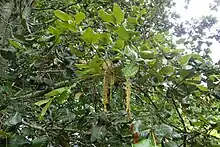Quercus semecarpifolia
Quercus semecarpifolia is an Asian species of oak. It is native to the Himalayas and nearby mountains in Tibet, Afghanistan, India, Nepal, and Pakistan,[3] where it is referred to as kharsu.[4] It is classified in subgenus Cerris, section Ilex.[5][6]
| Quercus semecarpifolia | |
|---|---|
 | |
| Scientific classification | |
| Kingdom: | Plantae |
| Clade: | Tracheophytes |
| Clade: | Angiosperms |
| Clade: | Eudicots |
| Clade: | Rosids |
| Order: | Fagales |
| Family: | Fagaceae |
| Genus: | Quercus |
| Subgenus: | Quercus subg. Cerris |
| Section: | Quercus sect. Ilex |
| Species: | Q. semecarpifolia |
| Binomial name | |
| Quercus semecarpifolia | |
| Synonyms[2] | |
| |
Quercus semecarpifolia is an evergreen tree up to 30 metres (98 feet) tall. The leaves are up to 12 centimetres (4+3⁄4 inches) long, with a few teeth along the sides but rounded at the tip.[3][7] It has been grown in middle Europe, Western Germany, winter-hardiness zone 7, withstanding -14 °C, without any damages. It gives a good, showy bush to small tree with lush green leaves. The epithet semecarpifolia refers to a resemblance between the leaves of this species and those of Semecarpus anacardium.[7]
In its native range, it serves as a keystone species, exhibiting up to 80% dominance at elevations between 2700 and 3300 meters.[4] In areas where less degradation has occurred, Q. semecarpifolia reduces light at the forest floor, encouraging the growth of shade tolerant herbaceous species.[4] Local people make use of kharsu more frequently than other native oaks for food, animal fodder, fuel, and timber.[8] Its leaves are also known to support Antheraea proylei silk worms, goats,[9] and prevent slug infestations.[4]
Fossil record
Fossils of Quercus semecarpifolia have been described from the fossil flora of Kızılcahamam district in Turkey, which is of early Pliocene age.[10]
References
- Qin, H. (2020). "Quercus semecarpifolia". IUCN Red List of Threatened Species. 2020. Retrieved 10 March 2023.
- "Quercus semecarpifolia Sm.". World Checklist of Selected Plant Families. Royal Botanic Gardens, Kew – via The Plant List. Note that this website has been superseded by World Flora Online
- Huang, Chengjiu; Zhang, Yongtian; Bartholomew, Bruce. "Quercus semecarpifolia". Flora of China. Vol. 4 – via eFloras.org, Missouri Botanical Garden, St. Louis, MO & Harvard University Herbaria, Cambridge, MA.
- Rawat, Balwant; Rawat, Janhvi M.; Purohit, Sumit; Singh, Gajendra; Sharma, Pradeep Kumar; Chandra, Anup; Shabaaz Begum, J. P.; Venugopal, Divya; Jaremko, Mariusz; Qureshi, Kamal A. (2022). "A comprehensive review of Quercus semecarpifolia Sm.: An ecologically and commercially important Himalayan tree". Frontiers in Ecology and Evolution. 10. doi:10.3389/fevo.2022.961345/full. ISSN 2296-701X.
- Denk, Thomas; Grimm, Guido W.; Manos, Paul S.; Deng, Min & Hipp, Andrew L. (2017). "Appendix 2.1: An updated infrageneric classification of the oaks" (xls). figshare. Retrieved 2023-02-18.
- Denk, Thomas; Grimm, Guido W.; Manos, Paul S.; Deng, Min & Hipp, Andrew L. (2017), "An Updated Infrageneric Classification of the Oaks: Review of Previous Taxonomic Schemes and Synthesis of Evolutionary Patterns", in Gil-Pelegrín, Eustaquio; Peguero-Pina, José Javier & Sancho-Knapik, Domingo (eds.), Oaks Physiological Ecology. Exploring the Functional Diversity of Genus Quercus L., Cham.: Springer International Publishing, pp. 13–38, ISBN 978-3-319-69099-5
- Smith, James Edward in Rees. 1814 The cyclopædia; or, Universal dictionary of arts, sciences, and literature. volume 29, pages not numbered, Quercus number 20
- Singh, Amit; Samant, S. S.; Naithani, Suneet (2021-09-01). "Population ecology and habitat suitability modelling of Quercus semecarpifolia Sm. in the sub-alpine ecosystem of Great Himalayan National Park, north-western Himalaya, India". South African Journal of Botany. 141: 158–170. doi:10.1016/j.sajb.2021.04.022. ISSN 0254-6299.
- Raju, J.; Sahoo, B.; Chandrakar, A.; Sankar, M.; Garg, A. K.; Sharma, A. K.; Pandey, A. B. (2015-04-01). "Effect of feeding oak leaves (Quercus semecarpifolia vs Quercus leucotricophora) on nutrient utilization, growth performance and gastrointestinal nematodes of goats in temperate sub Himalayas". Small Ruminant Research. 125: 1–9. doi:10.1016/j.smallrumres.2014.12.013. ISSN 0921-4488.
- Kasaplıgil, Baki (1977). "Ankara, Kızılcahamam yakınındaki Güvem köyü civarında bulunan son tersiyer kozalaklı-yeşil yapraklı ormanı" [A Late-Tertiary Conifer-Hardwood Forest From the Vicinity of Güvem Village, Near Kızılcahamam, Ankara] (PDF). Bulletin of the Mineral Research and Exploration (in Turkish and English). Ankara: General Directorate of Mineral Research and Exploration. 88: 94-102.
External links
